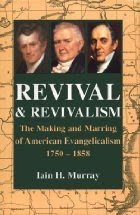My Hope as a Pastor
 Sometimes you read a book that just makes you angry, not because you disagree with its argument, but because you agree so heartily and care so deeply about the abuses and errors the book exposes. I have just finished such a book. The book is Iain Murray's Revival and Revivalism, an historical journey through the years of extraordinary revival in our country that were followed by years of revival-ism. Though they appear similar, the two terms refer to concepts that are theologically stark opposites.
Sometimes you read a book that just makes you angry, not because you disagree with its argument, but because you agree so heartily and care so deeply about the abuses and errors the book exposes. I have just finished such a book. The book is Iain Murray's Revival and Revivalism, an historical journey through the years of extraordinary revival in our country that were followed by years of revival-ism. Though they appear similar, the two terms refer to concepts that are theologically stark opposites.
I'll attempt to summarize the difference. Revival is the mysterious work of God, who through the outpouring of the Holy Spirit regenerates spiritually dead souls and brings them to life, giving them faith to believe in Jesus Christ, opening blind eyes to see and respond to the Gospel of grace. There have been times when God does this in great measure, not because the church does anything extraordinary, but because God wills to use the ordinary work of the church (Scripture preaching and prayer) to affect massive change. Since its inception, the church has seen seasons of this sort of outpouring, and it has been called revival.
Revivalism is human initiative to create the effects of revival. It begins with the premise that human beings are not, by their nature, totally spiritually dead. If sinful humans have the capacity to save themselves, then it only takes a decision of the will to become a Christian. Revivalism capitalizes on this theology by using methods to bring about decisions. All one needs to do to bring about "revival" is to persuade a person to will to be a Christian, and that can be done using techniques that I grew up seeing all the time: altar calls, prayer rooms, closing songs that never seem to end, closing the eyes and lifting the hand, praying a prayer that the leader speaks, etc. These visible methods were developed by certain pastors in the early to mid-1800s in order to quantify revival. Those who responded to the methods were told that they were Christians, that the very act of responding was the equivalent of being regenerated by God. Today, most people in the church equate this sort of methodological revivalism with revival.
Murray's purpose in telling the history is to separate these terms, embracing revival poured out by God through the Holy Spirit and exposing methods embraced by the church that mislead it and obscure true revival.
I'm sure some reading my synopsis here will protest: "Can there be any harm in using methods like this to get people to accept Jesus?" Yes. How many people are trusting in a prayer they prayed one time, or that time as a child that they "went forward?" How many parents are resting their hope for their kids on that baptism at age five, even though there has been no discernable Spiritual fruit in 25 years?
If someone prays the "sinner's prayer" at my prompting, and even raises his hand afterward, and I tell that young man he has now passed from death to life, and he hasn't, have I done any harm? I'm speaking from actual experience. I have baptized people that today have no discernable faith in Jesus. I want to be sure as a pastor that I lean into the work of the church as described in Scripture, faithful to the methods of Scripture and prayer, careful to discern the work of the Spirit in the life of individuals.
Murray ends his book with this hope for pastors.
It may be that a generation of freshly-anointed preachers is already being prepared. Whether that is so or not, when such men are sent forth by Christ we can be sure of certain things.
(I list them here as bullets for ease of reading.)
They will be hard students of Scripture.
They will prize a great spiritual heritage.
They will see the danger of 'unsanctified learning.'
While they will not be afraid of controversy, nor of being called hyper-orthodox, they will fear to spend their days in controvesy.
They will believe with John Rice that 'the church is not purified by controversy, but by holy love.'
They will not forget that the wise, who will shine 'as the stars for ever and ever,' are those who 'turn many to righteousness.' (Dan. 12:3)
They will covet the wisdom which Scripture attributes to the one 'that winneth souls.' (Prov. 11:30)
But their cheerfulness will have a higher source than their work. To know God himself will be their supreme concern and joy. They will therefore not be strangers to humility. And their experience will not be without trials and discouragements, not least because they fall so far short of their aspirations. If they are spared to live as long as John Leland they will be ready to say with him at last: 'I have been unwearedly trying to preach Jesus, but have not yet risen to that state of holy zeal and evangelical knowledge, that I have been longing after.' Whether their days be bright or dark they will learn to say with Nettleton that 'the milk and honey lie beyond this wilderness world.'
Father, let it be so of me.

1 comments:
As I grow older, I continue to get more disappointed by the work of Finney and Moody et al. who really went in the way of historical, rich, powerful liturgy and threw it away for their own pseudo-liturgy.
See: http://boarsheadtavern.com/2010/02/13/17460/
Post a Comment